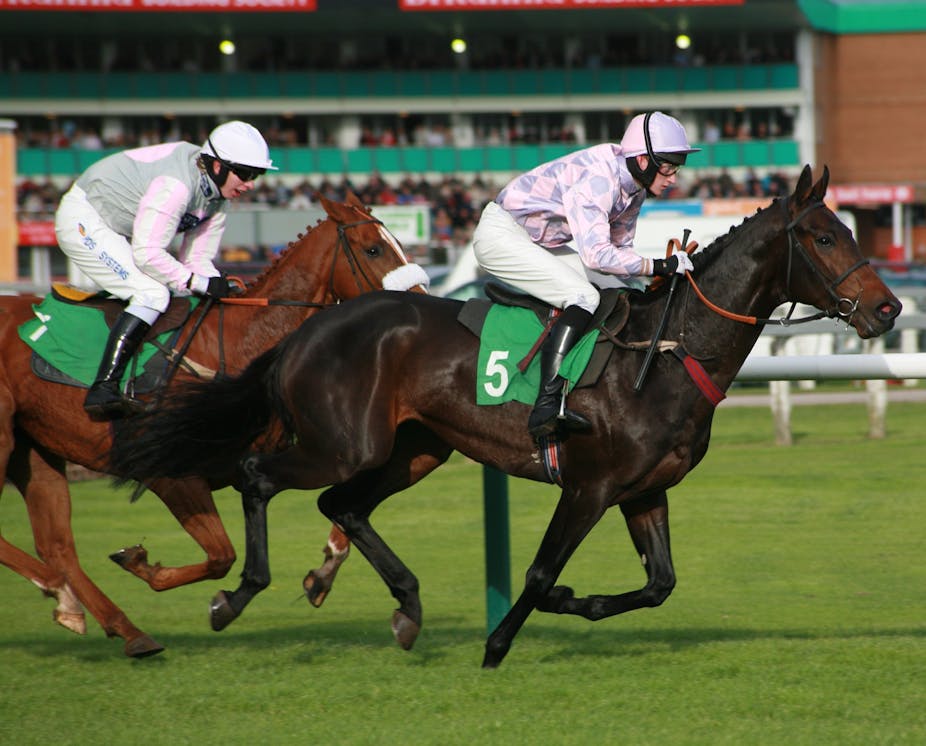This weekend, millions will watch (and have a little flutter on) the Grand National, one of the biggest and most popular horse races in the world. Its 30 fences over four miles and 770 yards also make it one of the most testing, for both jockey and horse – with animal deaths sadly not uncommon.
Over recent years, the horse racing authorities have made efforts to reduce the number of deaths in racing. But by its very nature, racing horses will always contain a large element of risk. A few weeks ago at Cheltenham, seven horses died over the four days of the popular festival. But whatever measures organisers take, deaths and injuries will occur on racecourses. So is horse racing too dangerous? Are too many horses dying for the sake of sport? Are those fatalities a necessary sacrifice or simply a reason to have the sport banned altogether?
The wider ethical issues surrounding animal domestication are by no means straightforward. Some animals become companions, and others are shot dead for sport. Pet chickens run happily around country gardens while huge numbers of their less fortunate relatives roast in kitchen ovens. So how do we determine what is acceptable when it comes to the death of animals? A large majority of UK residents are meat eaters out of choice. Yet even among them, many would object to watching the Grand National because of the dangers the horses face.
Perhaps we hold horses in higher esteem than farm animals. Maybe we accept the death of farm animals because “that is what they are bred for”. Or is it because the Grand National is live on television, and we are therefore directly exposed to what can happen when humans use animals for sport, that we empathise more?
Much easier to buy some meat from the supermarket shelf and ignore the fact that an animal has been killed for our pleasure. All meat eaters, myself included, are complicit in the deaths of billions of animals each year. The death of animals is a concept we accept. If we don’t, we have a choice not to eat meat. I’m not suggesting that being carnivorous means that you should automatically embrace horse racing with all its inherent dangers. But given our acceptance of the death of farm animals, perhaps the focus should not be on death itself.
Horses for courses
It is not always the risk of death that determines whether something is acceptable – and animal welfare should not focus on that eventuality alone. Cruelty happens in life and in dying. The concept of killing a chicken for food is something that I accept and do not consider to be cruel. However, millions of chickens are raised in cages each year in the UK and I do consider that cruel. Death might arguably be the best thing that ever happens to those chickens.
So what of racehorses? By focusing on the fatalities involved in the sport, I believe we are missing a far more pertinent question: do we give racehorses a good life? Are they really kept in the optimum conditions many are led to believe? Every comment about the deadly risks of horse racing, after all, is quickly countered by those within the sport who point out that racehorses are cared for in the best possible way, lovingly looked after at home, and given immediate veterinary attention if something does go wrong.
Is there much more we can do to give an animal a good life? If racehorse living conditions are so idyllic, surely the advantages of being a racehorse outweigh the risks. I’ve worked within the horseracing industry, both hands-on with horses and in less direct roles, and drawn my own conclusions.
The issue is not black and white, and although there are practices within racing I would change, I continue to watch, support and involve myself in the sport. Unfortunately, most of us tend to ignore how animals are raised and die in this country. Fatalities on the racecourse may cause us discomfort and even arouse in many a brief interest in animal welfare. But if you actually care about horses, or animals generally, think about their welfare. Consider whether the lifestyle of a racehorse is respectable and valued. Look past death, and consider how we treat animals while they are alive.

